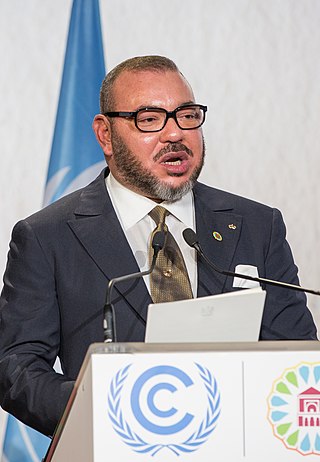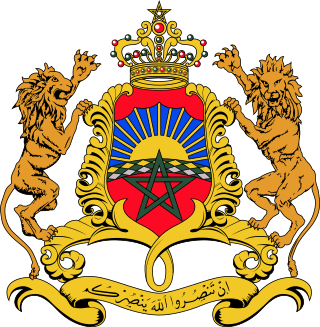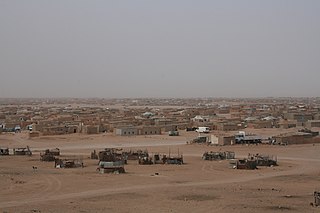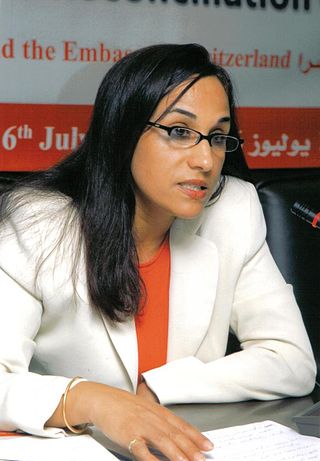Related Research Articles

Casablanca is the largest city in Morocco and the country's economic and business centre. Located on the Atlantic coast of the Chaouia plain in the central-western part of Morocco, the city has a population of about 3.71 million in the urban area, and over 4.27 million in Greater Casablanca, making it the most populous city in the Maghreb region, and the eighth-largest in the Arab world.

Mohammed VI is King of Morocco. A member of the 'Alawi dynasty, he acceded to the throne on 23 July 1999, upon the death of his father, King Hassan II.

Morocco became a highly repressive country under the absolute monarchy of King Hassan II, and continues to be considered repressive under the reign of King Mohammed VI, though the latter has instituted some reforms. Dozens of journalists, artists, and ordinary citizens are regularly sentenced to lengthy prison sentences for exercising basic rights enjoyed elsewhere in the world, such as freedom of the press, protesting the government, or criticizing government officials. Morocco heavily restricts basic human rights, such as freedom of speech, the right to assembly, and the right to criticize officials. Moroccans also feel the pressures of inflation within the country, such as the lack of basic services like healthcare, clean water, and the difficulty of parents to access quality education for their children. While there have been a handful of reforms that have been generally welcomed internationally, most Moroccans feel this is insufficient, and continue to be unhappy with the trajectory of the country under the policies of King Mohammed VI, despite his transition of the government to an ostensible constitutional monarchy. Under his father, King Hassan II, Morocco had one of the worst human rights records in Africa and the world, especially during the time period known as the "Years Of Lead", which lasted from the early 1960s until the late 1980s; it was a period in the country's history that was known for the brutal repression of political dissent and opposition, that involved wide-scale arrests, arbitrary detention, lengthy imprisonment, and even killings of political opponents. Currently, Morocco continues to face some of these issues, as well as other human rights problems, such as poor prison conditions, the mistreatment of women and the LGBT community, and the widespread use of torture by police. Despite the considerable improvements made in the last several years under the leadership of King Mohammed VI, who has rolled back some of his father's harshest decrees, repression of political dissidence, and torture of citizens by officials, is still commonplace in Morocco today.

The foreign relations of the Sahrawi Arab Democratic Republic (SADR) are conducted by the Polisario Front, which maintains a network of representation offices and embassies in foreign countries.
Fouzia Rhissassi is a Moroccan professor of social sciences at the faculty of arts at Ibn Tofail University in Kenitra, Morocco. Currently she holds a position of the UNESCO Chair on Women Rights.
The Moroccan Association for Human Rights is one of the biggest Moroccan human rights non-governmental organizations. It was founded on June 24, 1979, in Rabat to work for the preservation of human dignity and the respect, protection, defense and promotion of human rights in Morocco and Western Sahara. It uses different means to achieve its objectives such as the publication of a monthly newspaper, sit-ins and the holding of conferences. The AMDH considers it equally crucial to build partnerships with internal and external organizations and networks in order to be stronger in the fight for human rights.

Steven Guilbeault is a Canadian politician and activist who has served as Minister of Environment and Climate Change since October 26, 2021. A member of the Liberal Party, Guilbeault has sat as a member of Parliament (MP) since the 2019 federal election, representing the Montreal riding of Laurier–Sainte-Marie in the House of Commons. Guilbeault was previously the minister of Canadian heritage from 2019 to 2021.

The Sahrawi refugee camps, also known as the Tindouf camps, are a collection of refugee camps set up in the Tindouf Province, Algeria in 1975–76 for Sahrawi refugees fleeing from Moroccan forces, who advanced through Western Sahara during the Western Sahara War. With most of the original refugees still living in the camps, the situation is among the most protracted in the world.

Kacem El Ghazzali, is a Moroccan-Swiss secularist essayist and activist and is one of the few publicly atheist Moroccans. Kacem speaks English, as well as German, French, Arabic and Berber. Mostly known for his publicly voiced atheism, his writings stress the importance of freedom of thought which, in his view, is lacking in countries dominated by Islam. His articles have been published in/by the Richard Dawkins Foundation, Huffington Post, Le Monde, Neue Zürcher Zeitung, Frankfurter Allgemeine Zeitung, Basler Zeitung, Tages Anzeiger, Berlingske and others.

Raif bin Muhammad Badawi is a Saudi writer, dissident and activist, as well as the creator of the website Free Saudi Liberals.
Irreligion in Morocco is relatively uncommon, in the country. While a 2015 poll of about 1000 Moroccans by Gallup International found that 4% of respondents said they were "not religious", and 1% reported being a "convinced atheist", while 93% said they were religious
The Geneva Summit for Human Rights and Democracy is an annual human rights summit sponsored by a coalition of 20 non-governmental organizations. Each year, on the eve of the United Nations Human Rights Council's main annual session, activists from around the world meet to raise international awareness of human rights situations.

Intersex people are born with sex characteristics, such as chromosomes, gonads, or genitals, that, according to the UN Office of the High Commissioner for Human Rights, "do not fit typical binary notions of male or female bodies."

Anita M. Vandenbeld is a Canadian politician, who was elected to represent the riding of Ottawa West—Nepean for the Liberal Party of Canada in the House of Commons of Canada in the 2015 Canadian federal election. She was re-elected in the same riding in 2019, and re-elected in 2021.

Marie-Claude Bibeau is a Canadian politician who is the current Minister of National Revenue. She was elected to represent the riding of Compton—Stanstead in the House of Commons in the 2015 federal election. A member of the Liberal Party, she was sworn in as minister of International Development and La Francophonie on November 4, 2015. She was appointed the first female minister of Agriculture on March 1, 2019.

Amina Bouayach is a Moroccan human rights activist. Since December 2018, Bouayach has served as the president of the Moroccan National Human Rights Council. In this role, she affirmed in 2019 that there are no "political prisoners in Morocco."
Fatiha Mohamed Taher Mejjati is a Moroccan jihadist. She is the widow of Karim Mejjati, co-founder of the Moroccan Islamic Combatant Group and member of Al-Qaeda. Karim Mejjati is suspected of planning the 2003 Casablanca bombings and the 2004 Madrid train bombings.
The International Network of Liberal Women (INLW) is an association of women from around the world who support liberal values, which they define as "Individual freedom, human rights, the rule of law, tolerance, equality of opportunity, social justice, free trade and market economy." It is a member of Liberal International.
Women Living Under Muslim Laws (WLUML) is an international solidarity network established in 1984. It does academic and advocacy work in the fields of women's rights and secularism, focusing on the impact on women of laws inspired by Muslim religion or customs.
References
- ↑ "Fouzia Elbayed". Geneva Summit for Human Rights and Democracy . Retrieved 2022-07-06.
- ↑ "Boost for women's rights in MENA with establishment of INLW Morocco". Liberal International . October 13, 2017.
- ↑ "Panel discussion at CSW UN in March 2016". International Network of Liberal Women . March 25, 2016.
- ↑ Basu, Rekha (February 24, 2015). "A courageous push for rights in Muslim world". The Des Moines Register . Retrieved 2022-07-05.
- ↑ "Le Réseau international des femmes libérales s'implante au Maroc" [The International Network of Liberal Women establishes itself in Morocco]. Le Site Info (in French). September 20, 2017. Archived from the original on 2019-07-15. Retrieved 2022-07-05.
- ↑ "Morocco: Liberals for women's reproductive rights". Friedrich Naumann Foundation . May 2, 2015. Archived from the original on 2019-07-15.